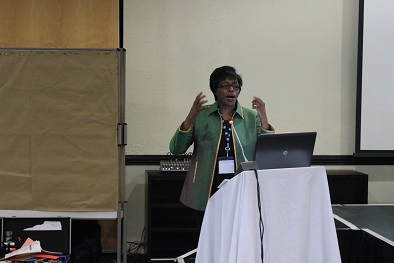The gender-based presentation shared lessons drawn from the Gender Mainstreaming in Transboundary Water Management (TWM) in SADC programme. The objective of the programme is to mainstream gender in the ongoing programme on TWM, which is quite a challenge, considering that TWM deals mainly with policies and decisions at the highest government levels, and that such decisions have to be linked to the water users at grassroots level, whose daily life is influenced by transboundary water issues.
The programme specifically is designed to provide advisory services to the River basin Organisation secretariats and seconded officials of the SADC member states; identify strategic entry points for gender mainstreaming in TWM at RBO-level, and advise on inclusive implementation of pilot projects in the basin areas. This programme will last just over 2 years, and a project team is based in Botswana: Dr. Mercy Dikito-Wachtmeister as Team-Leader and Muchimba Sikumba-Dils as Gender Expert.
As GWP SA is a key partner in the TWM Programme and have been implementing the Climate Change Mainstreaming project on behalf of SADC, the presentation and discussions relating to TWM gender mainstreaming will discuss ways in which the relevance of gender and social inclusion in TWM is demonstrated and can be further integrated into the policy and programming by decision makers and water specialists at different levels in the region. Within this context, GWPSA is embarking on an exercise whereby both the SADC wide gender policy and the GWP gender policy shall be mainstreamed in a way that it’s applicability in the TWP programme is tested and results in lessons learned can be disseminated at a later stage.
This 6th RBO workshop under the theme “Strengthening Regional Cooperation and Resilience in Water Related Disasters”, is in a series of workshops that have been successfully held in various member states within the SADC region. The last workshop was held in June 2012 in Harare Zimbabwe under the theme “Monitoring the Implementation of the Protocol on Shared Watercourses". About 140 participants are attending the meeting. The programme comprises four sessions: namely – The opening session; the second session which will include an overview from SADC on how they are supporting RBO. Included in this session have been reports where LIMCOM, OKAKOM, ORASECOM, and ZAMCOM shared updates on their current activities, challenges and way forward; and the third session which will present the TWM gender programme, including the TWM Climate Change Mainstreaming Project that GWPSA is implementing on behalf of SADC.
A number of outcomes are expected to be realized from this workshop, among which include: building a deeper understanding and awareness on the situation faced by various RBO’s with regards to water related disasters; Proposing SADC regional best practices on addressing water related disasters; Developing recommendations that will be implemented by the RBOs in order for the institutions to be better prepared; and Identifying the capacity gaps, needs and aspirations of RBO’s in order for SADC and other relevant institutions to provide appropriate support to the RBOs with regard to addressing disaster issues.
Picture: Dr. Mercy Dikito-Wachtmeister as Team-Leader - Gender Mainstreaming in Transboundary Water Management (TWM) in SADC
